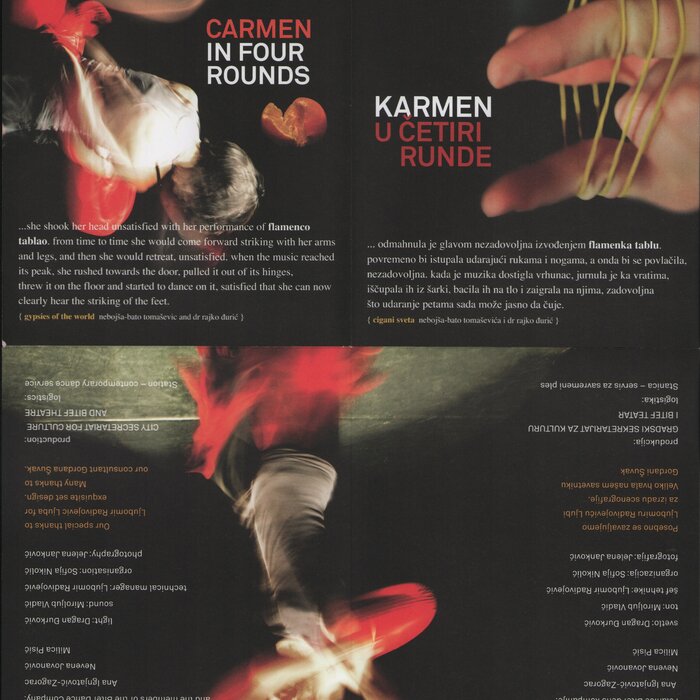While the most famous, superficial layer of Carmen's characterization speaks of a stereotypical femme fatale, who seduces and rejects, and is killed because of jealousy, Bizet insists in the librettist's message that the lyrics: "Love is like a bohemian (Gypsy), knows no laws", emphasize the indomitability of love as a central theme. According to the author, under that surface layer, however, several other more significant and current thematic lines can be discovered.
Carmen is presented as a fighter. This is its basic feature, from which the framework of the play derives, the context that gives the interpretation: boxing and the ring. Boxing was created by slaves fighting each other for freedom, but the opponent standing opposite Carmen is invisible, because he represents the system.
Carmen seduces in the first theme. Prosper Merime begins "Carmen" with a story that describes the daily bathing of tobacco factory workers in a nearby river. When evening falls, the guard rings the bell at the end of working hours, and they go swimming. The guards gather and watch the seductive flash of naked bodies in the darkness. One day they bribe the guard to ring the bell early, prompting the workers to strip and bathe in daylight. Merime here introduces the essence of seduction: lack of information. Over-revealing and over-illumination cancels seduction.
Today's woman is operated by seduction, and therefore by imagination, passion, madness, dream, illusion and everything that Carmen represents. If everything that is the opposite of reality is abolished, reality itself is also abolished. The heat of seduction has been replaced by the coolness of information. We are entering the field of a hyper-real over-informed and over-enlightened world that has lost its charm. This is how Carmen was killed, it was stated in the concept of the play.
The first topic is covered by three dancers who, through the play, deal with the phenomenon of seduction, performing an autopsy on it, in search of its essence. They also stand in his defense as the last guardians of seduction, illusion, imagination, madness, dream, and therefore reality as their opposite. Spotlights constantly strive to demystify and over-illuminate them, silence removes the seductive reference in music, and repeating and explaining the "magician's trick" removes the magic of movement, turning them into chimpanzees takes away their last weapon: femininity. Or maybe not?
In the second theme, Carmen is a gypsy.
According to the author, love is like a gypsy - it knows no laws. The Roma are the only people who resist the system, they have no ID, nor social codes, little is known about them, and there are even those whose existence is not recorded anywhere. And that is unacceptable for the system. Since more and more information about us is available (even what we consider our secrets), and the system tends to absolutize it by implanting chips in biceps, the existence of a nomadic people out of control is unacceptable. Under the slogan of empathic "integration", they resort to accelerated assimilation of Roma who are offered a better quality of life in metal containers (abolition of the meadow).
Mérimée and Bizet, both French, were inspired by a Gypsy woman, which, according to the author of the play, is very indicative of the current treatment of French policy towards the Roma. Freedom is only an idea and cannot be anyone's reality. And soon it will disappear as such. And if she cannot have freedom, Carmen chooses death. Therein lies her terrible appeal. Don Jose, as a representative of orderliness, systems and conventions, kills a gypsy woman for whom freedom is the most important thing, regretting that he himself is not like that.
The second theme is addressed by a girl who represents an "integrated", that is, assimilated Roma woman, who has lost touch with her culture to such an extent that she learns the language again, more like a tourist with a "Roma in her pocket". For her, everything that is traditionally passed down from generation to generation among the Roma is unknown, and what she learns about it is actually a distorted version served by other cultures. It will remain a secret for her that the Roma are the only people who have never been at war and who, according to legend, wander, coming between the warring parties and making peace with music and dance. Because she, like all of us, must understand why wars are necessary.
The third theme is dedicated to art.
The opera "Carmen" experienced a debacle at its first performance. The bourgeois audience was appalled by the realism, the low social status of the characters and the performers themselves, the pathological sexual lust of the main character from the bottom of the social sewers... The same fate was experienced by Monet's "Olympia" (a prostitute with too direct a view who replaced the goddess). Those works of art broke out of academicism and convention, established rules and expectations, and surprised everyone. They are not forgiven for that. And in art, the system has the last word. With the fact that Carmen, like Olympia, survived.
The third theme is addressed by Kaća, as an artist and a fighter for integrity in that sense (and as someone who does not understand the teacher's diary). Through the play, she builds her own version of Carmen, creates and plays it as a play within a play, and then comes to a situation where she defends her Carmen. When everyone falls and falters willing to surrender, and the system in the form of an assimilated Roma girl threatens to bring the final defeat, the ending changes: Carmen is not killed, because Katarina Stojkov continues to fight.




